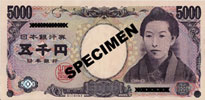Currency index
Advertisements
5000 Japanese yen note

Design
Description:
Size: 156 x 76mm
Date of first issue: 1 November 2004


The 5000 Japanese yen note is a denomination of Japanese currency. The ¥5000 note has been used since 1957. A portrait of Ichiyo Higuchi, a Meiji era writer and poet is featured on the obverse of the note. The reverse depicts Japanese irises(kakitsubata) from the Irises screen by Korin Ogata.
Security features
Security features can help you to tell if your 5000 Japanese yen note is fake or real.


1. Portrait watermark

Hold the note to light and look for the watermark, similar to the large portrait. The watermark is part of the paper itself and can be seen from both sides of the banknote.
2. Ultrafine-line printing

The printed lines and colors on the note are sharp, clear and free from smudges or blurred edges.
3. Hologram

When the banknote is tilted, the color and pattern of the design change.
4. Watermark-bar-pattern

When the banknote is held up to the light, two vertical watermark bars (three bars for the 10000 yen note, one for the 1000 yen note) become visible. This feature is more difficult to reproduce with personal computers or color copiers than the traditional watermark.
5. Latent image

When the banknote is viewed from a certain angle, the number "5000"appears on the center bottom of the front side, and the word "NIPPON" ("Japan" in Japanese) on the right in the middle of the back side.
6. Pearl ink

When viewed from different angles, a semi-transparent pattern printed with pink pearl ink appears in the blank areas of the left and right margins of the front of the note.
7. Microprinting

The 5,000 yen note has the words "NIPPON GINKO" ("Bank of Japan" in Japanese) printed in micro letters. Micro letters of different sizes are also included in the background design.
8. Luminescent ink

As in notes issued since December 1, 1993 (with serial numbers in brown), the Governor's seal on the front side glows orange under ultraviolet light. Likewise, some parts of the background pattern fluoresce yellowish-green.
9. Intaglio printing

Raised printing is used for some features of the new note.
10. Tactile marks

To help the visually impaired people in detecting the note by touch, a recognition symbol with a rougher texture, printed intaglio, is adopted.
Sources:
boj.or.jp
wikipedia.org







Follow currencyguide.eu